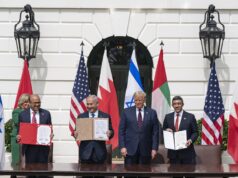Henry Kissinger once said that Israel has no foreign policy and that its foreign relations are affected by domestic politics. This is true, up to a point. But it is not only true for Israel.
Last week, the United States under President Barack Obama and Secretary of State Hillary Clinton imitated Israel’s mode of action. Or, they may have simply done what is inevitably unavoidable in a democracy: presenting a questionable foreign policy achievement in order to score domestic points.
On Friday, Secretary Clinton announced a dramatic breakthrough: the resumption of direct peace talks between Israel and the Palestinian Authority (PA). A breakthrough? Well it’s good to know that people in Washington still maintain their sense of humor.
Between 2007 and 2008, then-Israeli Prime Minister Ehud Olmert and Palestinian Chairman Mahmoud Abbas met eye-to-eye 11 times – all without preconditions or Israel freezing settlement activity in the West Bank and Jerusalem. According to both Olmert and Abbas, the two sides were close to producing an agreement. Whether or not that is true remains debatable, but the spectacle of Abbas coming to Jerusalem for talks became a routine scene.
These trips culminated, however, at the end of 2008. The War in Gaza at that time coupled with the ascendancy of the Netanyahu government strained relations. But more consequential was the inauguration of a new American president who wasted little time in demanding an Israeli freeze on settlement construction as a precondition for the resumption of peace talks. In turn, the Palestinians, hardly believing their good fortune, toughened their position on preconditions. Indeed, there is a simple truth that while events may change in the Middle East, the Palestinian leadership will never be more flexible or more accommodating during peace talks than the American administration of the day.
And yet, approximately 18 months later, the Obama administration has successfully called together the leaders of both parties to engage in direct peace negotiations without preconditions. Kissinger, and the interplay between foreign and domestic politics, explains why the Obama administration so rapidly changed its tune.
Nearly ten months ago, President Obama managed to extract a commitment from Netanyahu to suspend settlement construction. Obama thanked the Israeli leader by maintaining an arm’s length between the U.S. and Israel, all the while extending his hand to the Muslim World in an effort at appeasement that would make Neville Chamberlain proud. And yet, the U.S. has seen neither Palestinian flexibility, nor Arab and Muslim diplomatic support for the administration, nor an anti-Israel tilt of American public opinion and body politic.
If at all, the anti-Israel buzz turned out to be a drag on the administration – another issue in which the president found himself on the opposite side of the majority of the American people. The same with regard to Congress, which has continued to be a mainstay of support for Israel on a bi-partisan basis.
Under these circumstance, the White House and State Department changed course. While it is too early to define the administration’s strategy, with November’s elections in mind, it seems that domestic considerations dictated the president’s change of tone, compelling the administration to put its policies that are detrimental to Israel on hold. And here we are at the fanfare surrounding the resumption of direct talks.
Both the Israeli and Palestinian leadership have proved their ability to maneuver in the troubled waters of Middle East diplomacy. This is not so for the current American administration. It is therefore obvious that the two leaders view President Obama’s diplomatic strategies with more than a grain of salt – which is another reason why this round of talks is not likely to produce a real breakthrough. And the fanfare so carefully staged will remain exactly that.
Dr. Josef Olmert is a JPC contributor and Adjunct Professor at American University. He is a well-known Israeli Middle East expert and brother of former Israeli Prime Minister Ehud Olmert.





